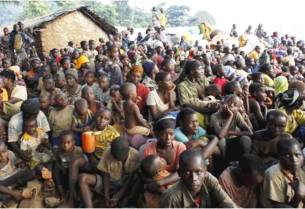Nearly 90,000 Burundians have fled to neighbouring countries since April 2015, according to UNHCR, while a significant number have sought refuge with friends or family in other towns or provinces within Burundi.
Unrest began last month with President Nkurunziza’s announcement that he intended to run for a third term of office, a re-election bid which his opponents say violates the constitution. At least 20 civilians have since died in clashes with police during mass demonstrations.
The security situation has continued to deteriorate in the wake of the failed military coup on 13 May and the subsequent death of Zedi Feruzi, opposition leader of the Union for Peace and Development (UPD) party.
Many people have fled their home in fear of the violence and the potential further insecurity with the coming elections in June 2015.
Internally displaced
Those fleeing the insecurity and violence are living in dire conditions and lack food, water, sanitation and health services, clothing and shelter, reports Leonidas Niyongabo, Provincial Development Officer of the Anglican Church of Burundi. With the closure of universities and secondary schools, students are particular vulnerable.
Many people are stranded at Burundi’s borders, unable to cross into neighbouring countries due to administrative obstacles.
“Urgent intervention is very much needed,” he said.
The Church has created emergency committees in ten of its parishes to assist as the security situation permits. A rapid needs assessment will be carried out to determine how best to respond, particularly to give support to children and women.
Given the ongoing security issues and access challenges, the provincial development team is working through local churches, seeking to build on the capacity of their communities. Each parish committee will include a pastor, a catechist, representatives of women and youth, and a leader from the local administration.
These committees will be responsible for all steps of the response, including needs assessment, coordinating and monitoring the emergency response and putting an early warning system in place, if needed, to highlight risk and prevent further harm, according to Mr Niyongabo.
The Anglican Church in Burundi has already done extensive training with local churches and communities in Disaster Risk Reduction and Management, in partnership with Episcopal Relief & Development.
“Most humanitarian organizations are leaving the country, which adds to the urgency,” Mr Niyongabo said, stressing the importance of the church’s role, remaining embedded within its own communities.
Response in neighbouring countries
Anglican churches in neighbouring countries also are responding to the crisis, assisting Burundian refugees arriving in their dioceses. Nearly 10,000 Burundians have crossed into the eastern part of the Democratic Republic of Congo and nearly 47,000 have sought refuge in Tanzania, according to UNHCR.
Refugees in DR Congo
The Diocese of Bukavu in the Anglican Church of Congo is seeking to assist 150 refugee families, in total 600 people. The Bishop of Bukavu, Mgr Bahati Bali-Busane Sylvestre, has been in touch with the Anglican Alliance to highlight the needs of the refugees arriving from Burundi.
“A wave of refugees, composed of women and children looking for safety, is currently in South Kivu Province of D.R. Congo. Many of them are living either in church buildings or in host families. Only a little number of refugees receives assistance from UNHCR and national or international NGOs. So, the others are suffering,” Bishop Bahati said.
Refugees in Tanzania
On the other side of Burundi, the Diocese of Western Tanganyika in the Anglican Church of Tanzania reports a new influx of Burundian refugees. The diocese has been donating food and non-food items to refugees at way stations as they halt on their journey towards the Nyarugusu refugee camp.
The diocesan Health and Development Coordinator, John Mhanuzi Wabike, has contacted the Anglican Alliance to share information on the Church’s response. “The Anglican Church has been in the front line to serve Burundian refugees since 1993 during the genocide conflict, assigned by UNHCR as a community services provider for 8 years,” he said.
“With this new influx of Burundian refugees, the Diocese of Western Tanganyika has served at least 550 refugees by donating food and non-food items. Most refugees, mainly women and children, are suffering from hunger, lack of clothes, food and cooking utensils,” Mr Wabike said.
Request for prayer
We ask that you pray for the Church and peoples of Burundi and for those neighbouring countries offering assistance.
On behalf of the Anglican Church of Burundi, Leonidas Niyongabo thanked the Anglican Communion for its support for people in crisis and requested further prayer.
“We ask you to continue to pray for the country and for all the people of Burundi. May the hand of God continue to work so that God’s righteousness, peace, and unity prevail in Burundi,” he said.
Information on how to support the response of Anglican churches to people displaced by the crisis in Burundi will be available shortly on the Anglican Alliance website.
Share prayers for Burundi on the Prayer Wall of the Anglican Communion website.
Photo credit: Burundian refugees at the Kagunga way station in western Tanzania. Diocese of Western Tanganyika

